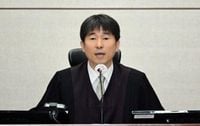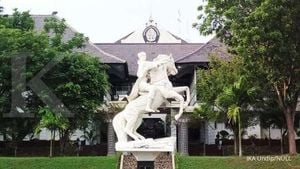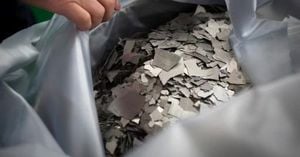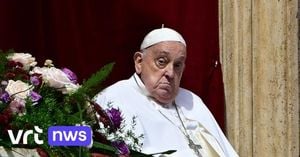On April 21, 2025, the 25th Criminal Agreement Division of the Seoul Central District Court held the fifth public trial of former President Yoon Seok-yeol, who faces allegations of election interference and insurrection. This trial marked a significant moment as it was the first time Yoon's appearance in the defendant's seat was revealed to the public, drawing considerable media attention.
Judge Ji Gwi-yeon presided over the proceedings in courtroom 417, and upon entering, she explained the reasons for allowing filming in the courtroom. She stated, "This case has garnered significant public interest, and we have considered the public's right to know based on precedents from similar cases before the public trial commenced." This decision came after Judge Ji faced criticism for her earlier refusal to allow media coverage during Yoon's first trial on April 14, 2025.
Yoon, dressed in a dark navy suit and a red tie, arrived at the courthouse around 9:45 a.m. in a black security vehicle, entering through the underground parking lot before making his way to the courtroom. He took his seat on the right side of the fifth row, a position that kept him somewhat obscured from the view of the public and the media. His demeanor seemed calm as he occasionally engaged in quiet conversations with his legal team.
As the trial began at 10 a.m., Judge Ji, along with two associate judges, reiterated the importance of transparency in the legal process. She emphasized that the court's decision to permit filming was made with careful consideration of the public's interest. This was a notable shift in policy, reflecting the growing demand for accountability and openness in high-profile legal cases.
Throughout the proceedings, Yoon remained composed, even smiling occasionally as he surveyed the courtroom. Despite the intense scrutiny, he did not directly engage with the cameras, instead focusing on the legal discussions at hand. The atmosphere in the courtroom was charged, as the implications of the trial extend beyond Yoon himself, touching on broader issues of governance and the rule of law in South Korea.
During this session, the defense team conducted cross-examinations of key witnesses, including Colonel Cho Seong-hyeon and Lieutenant Colonel Kim Hyeong-gi, who had previously testified regarding orders they received during the alleged insurrection. These testimonies revealed that they were instructed by their superiors to forcibly remove lawmakers from the National Assembly, a claim that adds weight to the allegations against Yoon.
The Military Human Rights Center, a prominent advocacy group, took a proactive role in the events surrounding the trial. They submitted a petition containing over 100,000 signatures urging the court to re-arrest Yoon, citing concerns over the integrity of the judicial process and the need for accountability. Lim Tae-hoon, the center's director, held a press conference outside the courthouse, stating, "Yoon Seok-yeol is now a free man due to the absurd decision by Judge Ji Gwi-yeon on March 6, 2025, to dismiss the warrant without reason. We believe that for the safety of the public and the complete resolution of the insurrection, Yoon must be re-arrested immediately."
Yoon's legal team has faced significant challenges throughout the trial, particularly regarding the credibility of the witnesses and the legality of the actions taken during the alleged insurrection. The defense argues that the instructions given to military personnel were misinterpreted and that Yoon did not have direct involvement in any illegal activities.
As the trial unfolded, the public's reaction was mixed, with some expressing outrage over the perceived leniency shown to Yoon by the judicial system. Critics have pointed out that Yoon's legal privileges, such as being allowed to enter the courthouse in a security vehicle and using a private entrance, reflect a double standard in how the justice system treats high-profile figures compared to ordinary citizens.
The media's role in covering the trial has also come under scrutiny. Following the initial ban on filming during Yoon's first court appearance, there has been an ongoing debate about the balance between the right to a fair trial and the public's right to information. Judge Ji's decision to allow filming this time was seen as a step towards greater transparency, but it also raised questions about the potential impact of media coverage on the proceedings.
As the day progressed, the courtroom filled with reporters and supporters of both Yoon and the Military Human Rights Center. The atmosphere was tense, with each side preparing for what could be a pivotal moment in South Korea's legal and political landscape.
The trial is expected to continue for several sessions, with more witnesses scheduled to testify. The outcome could have far-reaching implications not only for Yoon Seok-yeol but also for the future of political accountability in South Korea. Observers are keenly watching how the court balances the demands of justice with the complexities of a politically charged case.
In the coming days, as more evidence is presented and testimonies are heard, the public's interest in the trial is likely to intensify. Legal experts suggest that the proceedings will set important precedents for how similar cases are handled in the future, particularly regarding the accountability of public officials.
As the trial of Yoon Seok-yeol unfolds, it serves as a critical reminder of the ongoing struggle for justice and transparency in governance. The eyes of the nation remain fixed on the courtroom, eager to see how this significant chapter in South Korea's history will play out.
![지귀연 들어오자 尹 '벌떡'‥재판장, 직접 입 열더니 [현장영상]](https://thumbor.evrimagaci.org/uZ8hUo_QBMc8ugDW6exYmqIUcxk=/200x0/tpg%2Fsources%2F0d9b7aae-526c-4213-97d3-a0adf425dc16.jpeg)
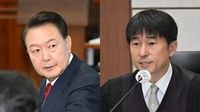
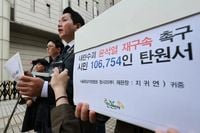
![[바로이뉴스] 직접 입 연 지귀연 판사…](https://thumbor.evrimagaci.org/8PFRqaZ8fMgTM3USRcS64tysaDQ=/200x0/tpg%2Fsources%2Fe2439b16-d4d6-4e06-abb6-5ec5ef9a82bf.jpeg)
